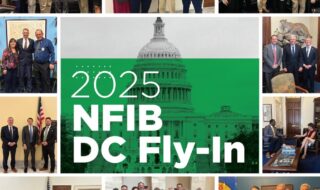April 3, 2024 Last Edit: July 26, 2024
Legislation would strengthen the requirements to analyze the impact of regulations on small businesses
Small businesses and NFIB support reducing burdensome regulations and considering the impact of regulations on small businesses. On March 21, the House Judiciary Committee advanced the Prove It Act, which would strengthen the requirements for government agencies to analyze the impact of regulations on small businesses. This legislation would also increase small business engagement in the regulatory process.
“Small businesses are often overlooked when analyzing new regulations and mandates from government agencies,” said Josh McLeod, NFIB Director of Federal Government Relations. “Small business owners have consistently ranked ‘unreasonable government regulations’ as one of their top concerns for running their businesses. The Prove It Act is a critical step in reducing the onerous regulation burdens and red tape small businesses face.”
The Prove It Act seeks to address the loopholes in the Regulatory Flexibility Act (RFA), which was enacted to minimize the impact that federal regulations have on small businesses. However, as NFIB’s 2023 study found, agencies use loopholes in the RFA to underreport, minimize, or ignore the impact of regulations on small businesses.
The Washington Times published an editorial from Beth Milito, Executive Director of NFIB’s Small Business Legal Center on the proposed regulations that will affect small businesses this year and the impact of onerous red-tape, costly mandates, and paperwork burdens on Main Streets nationwide.
A recent analysis shows the total cost of federal regulations in 2022 was $3.079 trillion. The study found that the average U.S. company pays approximately $13,000 per employee to comply with federal regulations. The pace of regulations is drastically increasing with additional regulatory costs and paperwork hours proposed by the administration.
“Let’s be clear. Imposing more regulatory costs and paperwork burdens does not open ‘doors of opportunity’ for small businesses,” explained Milito. “This aggressive regulatory agenda is a wet blanket for small businesses that don’t have compliance officers or lawyers to navigate red tape.
NFIB previously sent a letter of support to members of Congress explaining how small businesses would benefit from the legislation. NFIB also joined a coalition letter urging legislative action.
TAKE ACTION: Share personal stories about how federal regulations impact your small business. NFIB will use this information to educate lawmakers about the regulations that hurt small businesses the most.
NFIB is a member-driven organization advocating on behalf of small and independent businesses nationwide.
Related Articles













